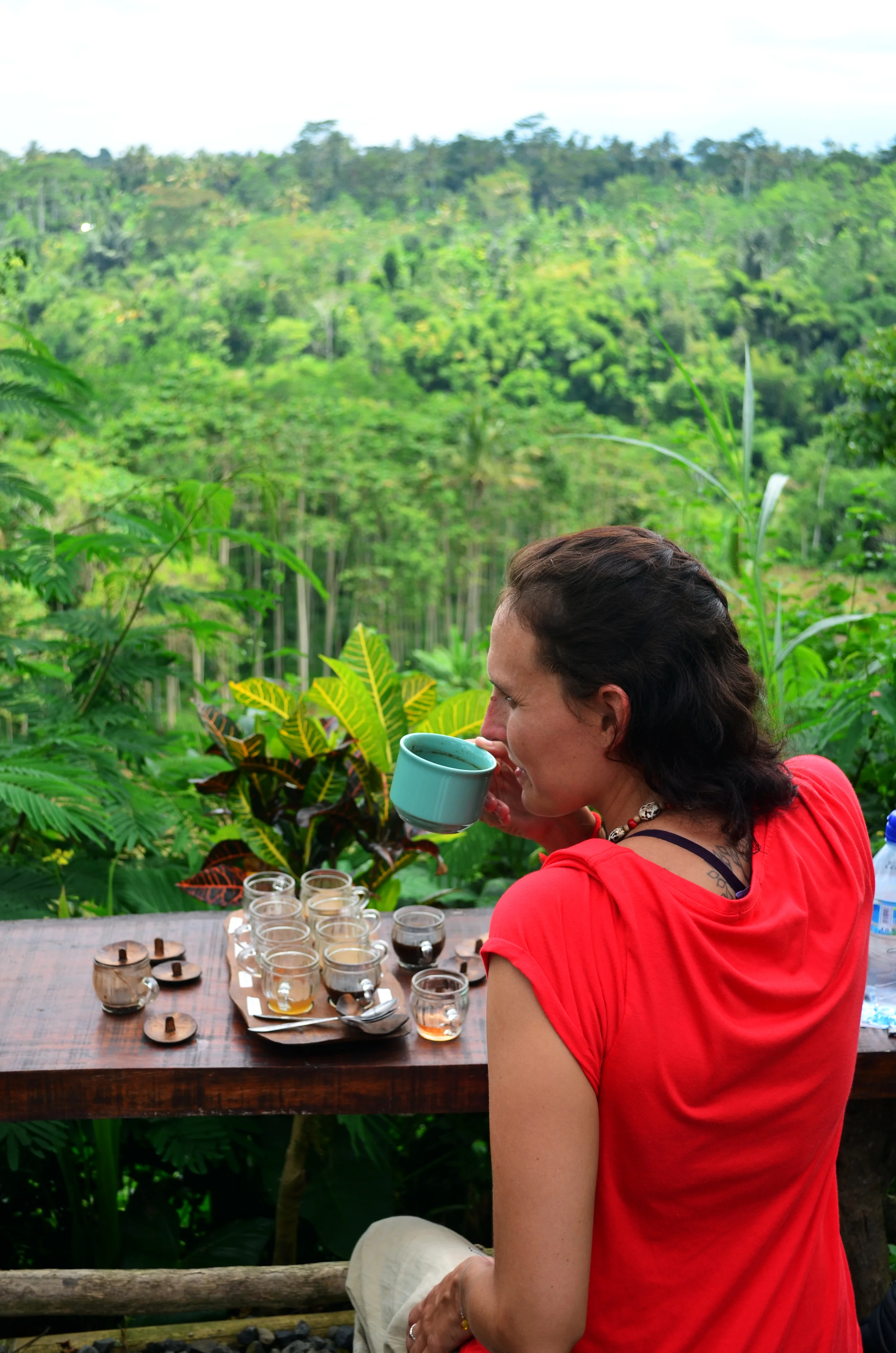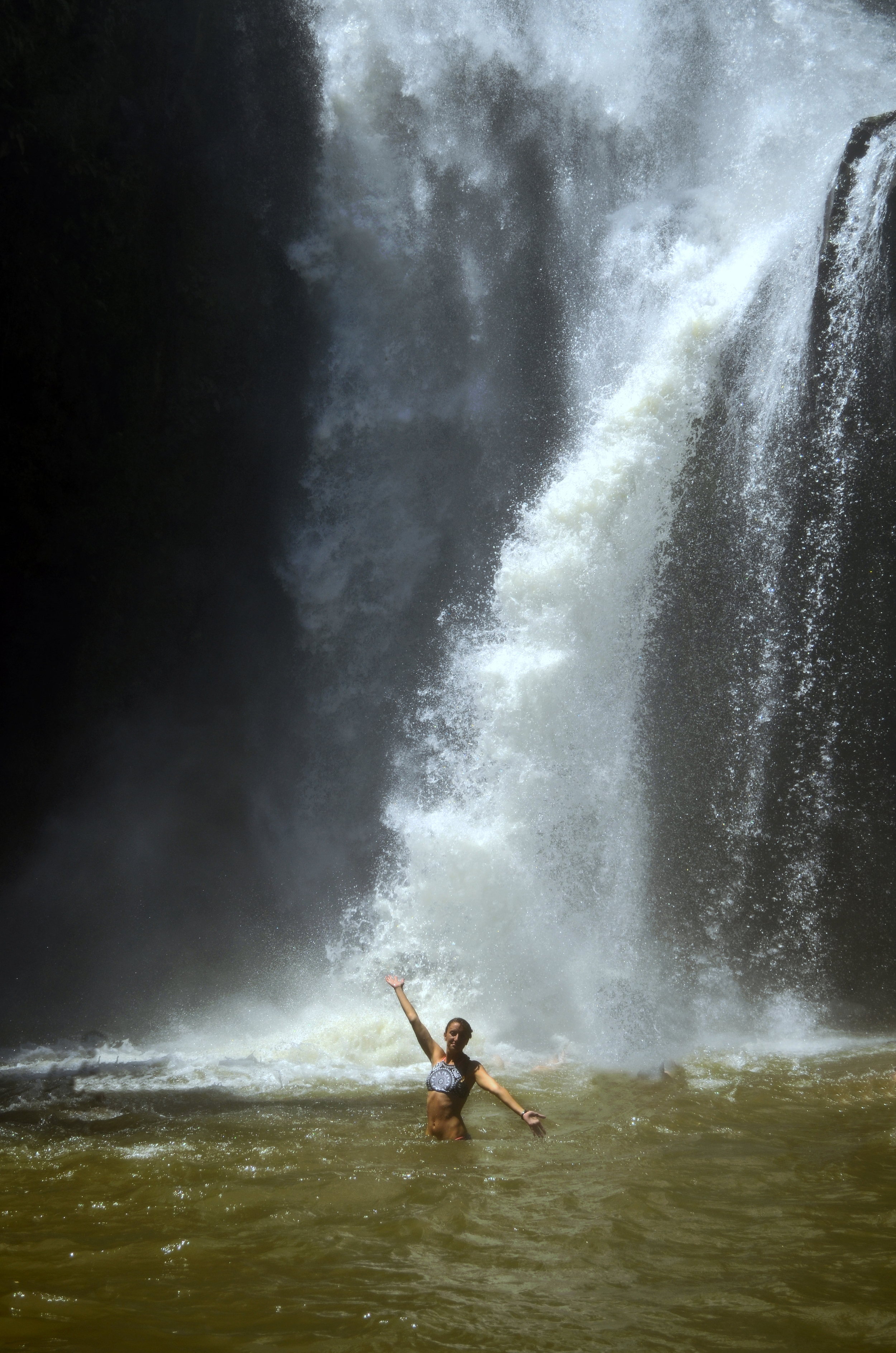A Stroll Through Old Town Bali
Ubud, Bali
Greatest Moment: There are so many to choose from! Ubud in itself is considered the cultural center of Bali, so we expected great things. From walking around the ancient temples and incredible bayon trees of Monkey forest, to swimming at the base of a waterfall, to traversing through the moss covered Hindu temple of Besikah, and to the incredible Indonesian dishes we tried, Ubud did not fail in our estimation. Our truly favorite moments were however at the spiritual and physical openness of our yoga class and spending a couple hours at a coffee plantation.
Yoga at a place called YogaBarn is recommended for most who go to Ubud. It is a place where all the “yogis” congregate, drinking raw and healthy smoothies and eating ethical and earthy foods. Overlooking a small rice field, a platform sits and becomes a space of silent relaxation. Where one connects their breathing to their movements, and experiments in the stability of foot along with the stability of mind. It was difficult—we both were sweating and struggling to even accomplish a proper downward dog move! But the messages were clear from the instructor, and we took from it a healthy remembrance of why we are traveling. Why we breathe on a daily basis. To breathe in life, and on exhaling, make room for the emptiness that is also a part of existence. The body is an incredible thing, and one’s mentality takes an immense role in its overall health.
Relaxed from our experience at YogaBarn, the following day we took a motorbike to the gorgeous rice terraces and the Pura Besikah temple. On our way, a man on motorbike rode next to us, engaging in friendly conversation. He had a coffee plantation, and we decided that we would love to see it!! So we pulled off into this adorable place, lined with all the vegetation you can imagine that goes into spices and drinks. We saw the vanilla beans, and the roots of turmeric, ginger, and ginseng. We saw coffee bean trees, tea trees, banana trees, and cocoa plants. We both roasted the coffee and grinded the beans, as it is still the tradition way that they prepare their coffee. Afterwards we sat overlooking the plantation as we did free tasting of many teas, discussing their health benefits, and the many coffees they produce as well. It was delicious. Kathy drank the coconut coffee, the chocolate coffee, the vanilla, ginseng, and ginger coffees! Jamie drank the ginger tea, rosella tea, mangosteen tea, and the cocoa drink! We learned so much, and we had such a great time with our local guide!
Worst Moment: Besides the monkey that came up and stole my cheese dounut, the “worst” moment is one of the funniest. Our hotel room was basic, with A/C, and a cute garden around our balcony. As you entered into our room, the bed was large and the space open and inviting. By the time you entered the bathroom, you had a pleasant opinion of the place. The shower, was the only thing that made you stop and wonder. It was a tub, and the shower head came from the wall at stomach level. Luckily we can detach the shower head and wash our hair with it, but mostly our showers were like that of Will Farrell in “Elf”---a human much too big for the tiny elf showers.
Lesson Learned: Don’t always pass up an offer when a stranger comes up to greet you. It is easy to do here, because locals are always coming up to you for taxi, spa, or selling purposes. But we did not brush off the man on the motorbike and his information about his coffee plantation, and we were so happy we didn’t. One thing that we learned about at the coffee plantation, is the process and nature of luwak coffee. The Luwak animal is indigenous to Indonesia, and loves to eat fruits and berries. In particular, it loves the berry surrounding the coffee bean. They are notorious for choosing the best coffee beans, and will not eat beans that are spoiled or of bad quality. They are also nocturnal. So in these areas specifically, the luwak creature is sought after to guide coffee producers in their production of quality coffee. They will capture the luwak and enclose their plantations, allowing ample room for the luwak to live a happy life and eat the coffee beans. Because if the luwak is sad or depressed, it won’t eat even the best of beans. During the day they search to ground for the luwak’s excrement, finding the beans within it. These coffee beans go through the drying process much faster within the luwak’s digestive system then in other methods, which makes luwak coffee beans very expensive and sought after. We of course had to try some, and found that even drinking it black, without sugar, flavor, or milk, this coffee is quite smooth and easy to drink! A cup of this can cost anywhere from $60-90 in Europe or America, or so they say, making it one of the most expensive coffees in the world.
Cultural Insight: Every morning the local people here give offerings. Bali is primarily Hindu, and the people here worship daily to the supreme god, “Wivi” (that is how our guide pronounced it), or in his manifestations of Vishnu, Shiva, Brahama, Ganesha, ect. Before the steps of houses, businesses, and deity statues, there is a banana leaf box filled with flowers, a cigarette, food, and often times incense. This is for good fortune and wealth. There is great respect given to everyone here, and with the incense, the broken temple walls lining the streets, and old religious practices, you feel as though you stepped into an ancient time while in Ubud.
P.S. We're in the Gili Islands now and internet is hard to come by, so dont worry, more posts will come, just may take some time!!!




























